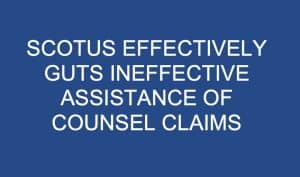SCOTUS Effectively Guts Ineffective Assistance of Counsel Claims: Shinn v. Ramirez
On Monday, the United States Supreme Court issued an opinion effectively overruling past precedent regarding evidentiary hearings to establish ineffective assistance of counsel claims in Shinn v. Ramirez. Two defendants Ramirez and Jones were convicted of capital murder in Arizona state court and sentenced to death. Both defendants sought relief through a direct review by the Arizona Supreme Court where neither defendant raised the claim of ineffective assistance of counsel which was denied. They then moved for habeas corpus relief in federal court for ineffective assistance of counsel.
The Federal District Court of the Ninth Circuit ruled that the defendants could present evidence outside the state-trial record to establish their claim of ineffective assistance of counsel due to the prior Supreme Court ruling in Martinez. The Supreme Court decision in Martinez’s only applied to prisoners whose claim involved ineffective assistance of counsel which was based on substantial evidence provides grounds for an evidentiary hearing to be held.
The Supreme Court addressed the question of how the past rulings are affected by the Anti-Terrorism and Effective Death Penalty Act (AEDPA) passed by congress. The AEDPA prohibits using evidence outside the state court record to support the claim unless the defendants “have failed to develop the factual basis of a claim in State court proceedings.” This is limited further to two situations which are (1) a new or unavailable constitutional ground can be applied retroactively based on a Supreme Court ruling or (2) facts that were unavailable at the time of the original trial could not have been found even through due diligence on the part of counsel. U.S.C. § 2554 (e)(2). Ramirez and Jones’s arguments relied on the past precedent Martinez’s.
The majority refutes those arguments on the grounds habeas corpus review is an extreme remedy narrowed significantly by the AEDPA because Congress foreclosed expansion of the Martinez decision. The majority states Martinez should not be used to relitigate a final ruling by granting an evidentiary hearing rather it was to protect against the procedural failure made by an appellate attorney for failure to state a claim. The majority declared a prisoner is at fault for not presenting the evidence in support of a claim not raised by appellate counsel.
This ruling is rather concerning surrounding the constitutional rights of defendants seeking ineffective assistance of counsel claims. As this decision effectively narrows the evidence to only the state-trial record to establish ineffective assistance of counsel. Most claims for ineffective assistance of counsel are due to failures of counsel which are not within the state-trial record. In the Jones matter, there was a failure to investigate on the part of both the trial and appellate attorney regarding new evidence which showed Jones did not inflict the injuries on the deceased. This evidence was not within the state-trial record nor the appellate record because neither attorney took action to investigate or present the evidence to the court. The Supreme Court ruling makes it nearly impossible for attorneys to present outside evidence to support a client’s claim of ineffective assistance of counsel. Wrongfully convicted death row inmates now may be unable to present the best defense possible to prove their innocence.

